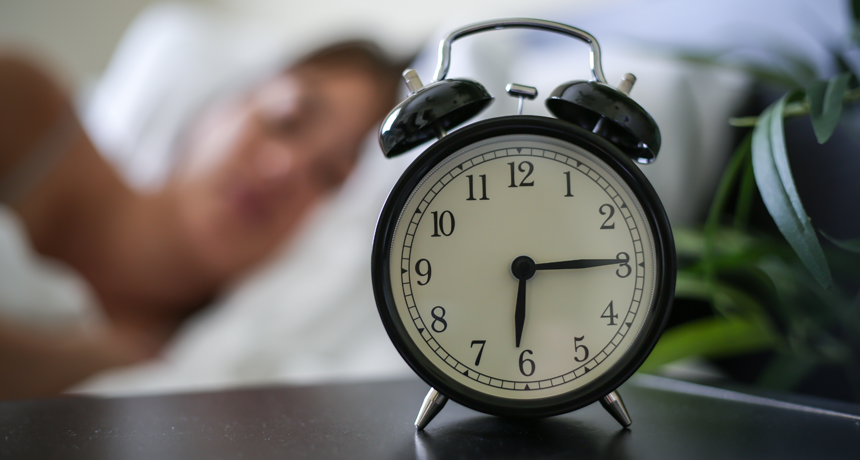As our ways of life turn out to be progressively requesting, we manufacture our lives around falsely separated days and evenings that oblige the need to work night shifts, remain up throughout the night, or travel between mainlands. In any case, this affects our regular body timekeepers, with undesirable results.
Not getting enough sleep makes us tired amid the day. However, the body’s clock additionally influences disposition, mental sharpness, craving, and heart work. We as a whole vibe the back and forth movement of everyday life, the day by day rhythms that shape our days. The most fundamental day by day mood we live by is the rest wake cycle, which is identified with the cycle of the sun. It makes us feel sluggish as the night hours wear on, and attentive as the day starts.

The presence of the natural clock can be especially obvious when it’s topsy turvy: Jet slack and move work can toss our ordinary examples askew and inflict significant damage on physical and emotional wellness. Notwithstanding moving the clock a hour forward or in reverse when sunshine investment funds time starts or closures can disturb our natural tickers.
Upsetting our body’s characteristic cycles can cause issues. Studies have found there are increasingly visit auto collisions and work environment wounds when we spring forward and lose a hour of rest. Heart patients are at more serious hazard for myocardial localized necrosis in the week following the Daylight Savings time move. However, considerably progressively critical is that science keeps on finding essential associations between a disturbed clock and incessant medical problems, from diabetes to coronary illness to psychological decrease.

Focusing on the body’s regular rhythms is most likely more essential to our wellbeing than we understand. It’s not simply lack of sleep that influences our prosperity, but at the same time it’s the adjustment of our organic rhythms that can meddle with such a large number of body capacities, making us increasingly inclined to medical issues like contamination, disposition issues, and even coronary illness.
Why the organic check ends up upset in specific individuals, or normally with age, isn’t totally clear, however some have as of late recommended that it could to some degree have to do with the maturing of the eyes. Regular changes in the focal point and even the improvement of waterfalls let less light into the eye and, along these lines, the cerebrum; and this can influence organic rhythms.
There are numerous different reasons our bodies’ checks can leave synchronize, which likely include a blend of hereditary inclination and way of life decisions, for example, liquor utilization. In some cases the clock can get unset – similarly as with the progressions related with sunshine reserve funds time, air travel, or move work – and there’s just so much we can do until our body and its check are in balance once more.
In any case, keeping your calendar on track however much as could be expected is presumably the best exhortation. You most likely have a quite decent feeling of your body’s regular rhythms instinctively. Keep away from interruptions to your eat-rest cycles. Practice great rest cleanliness, and adhere to a rest plan that functions admirably for your body to keep the framework in its characteristic beat. Turning in somewhat prior, reducing caffeine late in the day, and sparing that last piece of work for the morning as opposed to remaining late up to complete it, can have a major effect in how your inside check capacities and by they way you feel.
Our Behaviors and Body Functions Run on Cycle
Melatonin is one hormone in charge of our body’s day by day cycle. At the point when sunsets and there is less light contribution to the SCN, the creation of melatonin, the hormone in charge of making us feel drowsy, goes up. At the point when it’s dull, more melatonin is discharged, which flags the cerebrum to go into rest mode. At the point when the sun rises, melatonin emission is restrained, and the cerebrum’s wakeful circuits continue.
Different systems likewise pursue a day by day cadence, a considerable lot of which are controlled by hormones and different aggravates that get prompts from the organic clock. For instance, the hormones in charge of appetite and digestion rise and fall through the span of the day. The synthetic compounds associated with safe framework work likewise shift. Aggravates that support the incendiary reaction ascend during the evening, (which is the reason fevers will in general spike at that point), and those that hinder it ascend amid the day.
Natural Disruptions to the Body’s Clock
The absolute best information we have about the jobs the natural check plays in our wellbeing originate from occurrences in which the cycle escapes match up. This can occur for various reasons, and we’re simply beginning to comprehend them in more prominent detail. Now and again we do things ourselves that upset our typical rhythms, such as traveling to a far off time zone. Here and there it’s different components, (similar to qualities or science) that assume a job.
Jet Lag
At the point when jet lag sets in, we feel confused, foggy, and lethargic at the wrong occasions of day in light of the fact that, in the wake of changing time zones, our body clock reveals to us it’s one time and the outside condition discloses to us it’s another. Truth be told, fly slack can be viewed as one kind of circadian cadence issue. It tends to be dealt with just be enabling the body to conform to the new time, despite the fact that it might take a few days for outer prompts (light) to enable the inward clock to get up to speed or fall back with its new cycle.
Invulnerability and Vaccinations
A large portion of us have encountered being progressively vulnerable to becoming ill when restless. The explanation behind this gives off an impression of being that sure synthetic concoctions in charge of safe capacity, similar to cytokines, come and go for the duration of the day and lack of sleep denies us of their best impacts. Body rhythms don’t simply upgrade immunizations’ capacity to give insusceptibility; they can influence the body’s capacity to fight contamination all alone. At the point when mice were presented to a bacterial contamination, the seriousness of their disease mirrored the season of day they were tainted.
It’s not simply in the lab that these impacts are seen. Infants who are given immunizations toward the evening – and who rest all the more directly after – have better resistant reactions to the inoculations. All things considered, a similar impact is valid in grown-ups, since our insusceptible frameworks change in comparable ways.